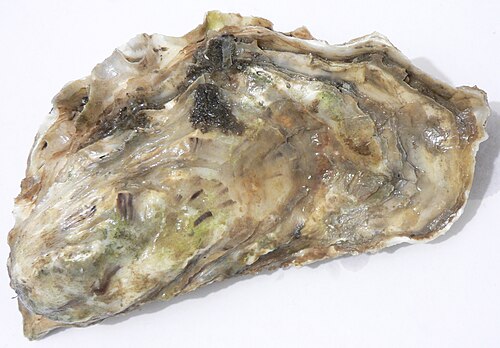Clamnoun
A bivalve mollusk of many kinds, especially those that are edible; for example the soft-shell clam (Mya arenaria), the hard clam (Mercenaria mercenaria), the sea clam or hen clam (Spisula solidissima), and other species. The name is said to have been given originally to the Tridacna gigas, a huge East Indian bivalve.
Clamnoun
Strong pincers or forceps.
Clamnoun
A kind of vise, usually of wood.
Clamnoun
A dollar (usually used in the plural).
Clamnoun
A Scientologist.
Clamnoun
(slang) A vagina.
Clamnoun
(informal) One who clams up; a taciturn person, one who refuses to speak.
Clamnoun
clamminess; moisture
Clamverb
To dig for clams.
Clamverb
To produce, in bellringing, a clam or clangor; to cause to clang.
Clamverb
To be moist or glutinous; to stick; to adhere.
Clamverb
To clog, as with glutinous or viscous matter.
Clamadjective
clammy.
Clamnoun
A bivalve mollusk of many kinds, especially those that are edible; as, the long clam (Mya arenaria), the quahog or round clam (Venus mercenaria), the sea clam or hen clam (Spisula solidissima), and other species of the United States. The name is said to have been given originally to the Tridacna gigas, a huge East Indian bivalve.
Clamnoun
Strong pinchers or forceps.
Clamnoun
A kind of vise, usually of wood.
Clamnoun
Claminess; moisture.
Clamnoun
A crash or clangor made by ringing all the bells of a chime at once.
Clamverb
To clog, as with glutinous or viscous matter.
Clamverb
To be moist or glutinous; to stick; to adhere.
Clamverb
To produce, in bell ringing, a clam or clangor; to cause to clang.
Clamnoun
burrowing marine mollusk living on sand or mud
Clamnoun
a piece of paper money worth one dollar
Clamnoun
flesh of either hard-shell or soft-shell clams
Clamverb
gather clams, by digging in the sand by the ocean
Clamnoun
a marine bivalve mollusc with shells of equal size.
Clamnoun
any of a number of edible bivalve molluscs, e.g. a scallop.
Clamnoun
a dollar.
Clamverb
dig for or collect clams
Clamverb
abruptly stop talking
Clam
Clam is a common name for several kinds of bivalve molluscs. The word is often applied only to those that are edible and live as infauna, spending most of their lives halfway buried in the sand of the seafloor or riverbeds.
Oysternoun
Any of certain marine bivalve mollusks, especially those of the family Ostreidae (the true oysters), usually found adhering to rocks or other fixed objects in shallow water along the seacoasts, or in brackish water in the mouth of rivers.
Oysternoun
The delicate morsel of dark meat contained in a small cavity of the bone on each side of the lower part of the back of a fowl.
Oysternoun
A pale beige color tinted with grey or pink, like that of an oyster.
Oysternoun
A person who keeps secrets.
Oysternoun
A shoplifter.
Oysteradjective
Of a pale beige colour tinted with grey or pink, like that of an oyster.
Oysterverb
(intransitive) To fish for oysters.
Oysternoun
Any marine bivalve mollusk of the genus Ostrea. They are usually found adhering to rocks or other fixed objects in shallow water along the seacoasts, or in brackish water in the mouth of rivers. The common European oyster (Ostrea edulis), and the American oyster (Ostrea Virginiana), are the most important species.
Oysternoun
A name popularly given to the delicate morsel contained in a small cavity of the bone on each side of the lower part of the back of a fowl.
Oysternoun
marine mollusks having a rough irregular shell; found on the sea bed mostly in coastal waters
Oysternoun
edible body of any of numerous oysters
Oysternoun
a small muscle on each side of the back of a fowl
Oysterverb
gather oysters, dig oysters
Oyster
Oyster is the common name for a number of different families of salt-water bivalve molluscs that live in marine or brackish habitats. In some species, the valves are highly calcified, and many are somewhat irregular in shape.































